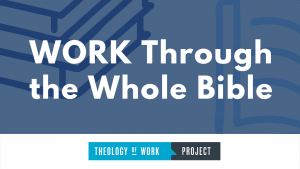44: Breaking the bonds of exploitation (Acts 16:16-19)

Scripture Reading: Acts 16:16-19
In Philippi, Paul and Silas encounter a girl with a spirit of divination. In the Greco-Roman context, this type of spirit was associated with fortune-telling—a connection that “brought her owners a great deal of money” (Acts 16:16). This seems to be an example of the grossest form of economic exploitation. When Paul acts, the result is spiritual liberation for the girl and financial loss for her owners. The owners respond by dragging Paul and Silas before the authorities, on charges of disturbing the peace.
This incident demonstrates powerfully that the ministry of liberation Jesus proclaimed in Luke 4 can run counter to at least one common business practice, the exploitation of slaves. Businesses that produce economic profit at the expense of human exploitation are in conflict with the Christian gospel. Paul and Silas were not on a mission to reform the corrupt economic and political practices of the Roman world, but the power of Jesus to liberate people from sin and death cannot help but break the bonds of exploitation. There can be no spiritual liberation without economic consequences. Paul and Silas were willing to expose themselves to ridicule, beating and prison in order to bring economic liberation to someone whose sex, economic status, and age made her vulnerable to abuse.
If we look ahead two thousand years, is it possible that Christians have accommodated to, or even profited from, products, companies, industries, and governments that violate Christian ethical and social principles? It is easy to rail against illegal industries such as narcotics and prostitution, but what about the many legal industries that harm workers, consumers, or the public at large? What about the legal loopholes, subsidies, and unfair government regulations that benefit some citizens at the expenses of others? Do we even recognize how we may benefit from the exploitation of others? In a global economy, it can be difficult to trace the conditions and consequences of economic activity. The book of Acts does not give principles for gauging economic activity. But it does demonstrate that economic matters are gospel matters.
Prayer: Jesus, I don’t want to contribute to exploitation. Help me to understand the economic consequences of my actions. Show me how I can work for the liberation of others. Amen.
For Further Exploration: Read The Community of the Spirit Confronts the Brokers of Power (Acts 16 and 19) from the Theology of Work Bible Commentary.
Author: Theology of Work Project
Theology of Work Project Online Materials by Theology of Work Project, Inc. is licensed under a Creative Commons Attribution-NonCommercial 4.0 International License. Based on a work at www.theologyofwork.org
You are free to share (to copy, distribute and transmit the work), and remix (to adapt the work) for non-commercial use only, under the condition that you must attribute the work to the Theology of Work Project, Inc., but not in any way that suggests that it endorses you or your use of the work.
© 2014 by the Theology of Work Project, Inc.
Unless otherwise noted, the Scripture quotations contained herein are from the New Revised Standard Version Bible, Copyright © 1989, Division of Christian Education of the National Council of the Churches of Christ in the U.S.A., and are used by permission. All rights reserved.

